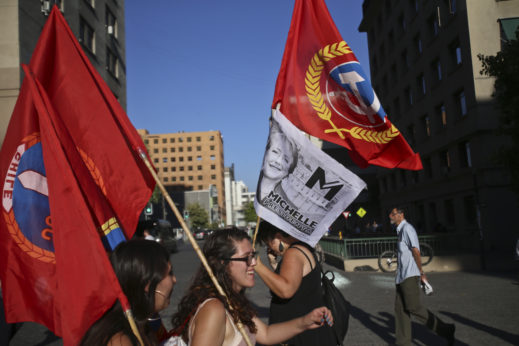
Sebastian Piñera, a billionaire who previously led Chile from 2010 to 2014, won a solid victory in the country’s runoff election for a new president on Sunday, December 17. With 3.8 million votes in this country of 18 million inhabitants, Piñera took 54.57 percent against his opponent, journalist Alejandro Guillier. Voter turnout was estimated to be 49.02 percent. The race determined the final outcome following the first round of elections on November 21.
In the first round of the elections in November, Piñera and his “Let’s go, Chile” coalition slate got only 36 percent of the vote, and the combined number of votes for left and left-center candidates was considerably higher. On that occasion, Guillier got 22.70 percent, and Beatriz Sánchez, the candidate of the Frente Amplio (“Broad Front”), a new left-wing coalition, scored a surprising 20.27 percent. Of the remaining five candidates who did not make it to the second round, most were left or left-center. Turnout in the first round was low, at only 46.72 percent. So the question for the second round was who could mobilize best. Labor and people’s organizations were firmly behind Guillier.
As the runoff election approached, the Frente Amplio and other left groups who had fielded presidential candidates in the first round came out in favor of Guillier. However, this may have been too little and too late; had all the voters who voted for left and left-center candidates in the first round come out for Guillier, he would have won handily. But it appears they did not.
The total vote, as opposed to the percentage turnout, actually increased a bit from November 21 to December 17, from 6.7 million to just over seven million. However, this did not represent a mobilization of the base of the center and left. On the contrary—Piñera won in all but two of Chile’s fifteen regions. The two which gave a majority to Guillier were Magallanes, the sparsely populated Southernmost province, and Aisen, also far to the South and also sparsely populated.
The major urban areas of Santiago (the capital) and Valparaiso gave small majorities to Piñera. The Araucanía region in central Chile, where 45 percent of the population consists of indigenous Mapuche people who have historically been maltreated by the country’s economic elites and persecuted by the political right, went for Piñera by 62.4 percent to 37.6 percent for Guillier, the highest margin for the right-wing candidate in the whole country.
In the runoff phase of the last elections in 2013, the present president, Michelle Bachelet of the Socialist Party, running as the candidate of the New Majority coalition (Socialists, Communists and others), resoundingly defeated the right-wing Alliance candidate, Evelyn Matthei, by a margin of 62 percent to 38 percent. In that election, Bachelet won by big majorities in the Metropolitan Santiago region, in Valparaiso, and in Araucanía. Matthei, her competitor then, did not win in a single region. One of the reasons given for these results was the unpopularity of the then-outgoing Piñera due to his right-wing policies.
How did the tables turn so fast?
Going into this year’s electoral season, it was clear that satisfaction with Socialist President Michelle Bachelet had dropped drastically. Like other countries of Africa, Asia, and the Americas who depend excessively on exporting commodities, Chile has been undergoing economic difficulties. Also, there have been corruption scandals which have included members of Bachelet’s own family.
The Mapuche indigenous people have not been satisfied that Bachelet’s government has treated them appropriately, and there have been violent clashes between Mapuche protesters and security forces. The all-important fight for improved public education has not elicited as decisive a response from the government as many young people wanted and expected.
And many on the left, including the Communist Party partners in the governing coalition, have been unsatisfied by Bachelet’s insistence on bringing Chile into the Trans-Pacific Partnership and the Venezuela bashing that has come from her foreign ministry. This kind of dissatisfaction almost certainly contributed to the move of left-leaning voters toward the Frente Amplio in the first round of the elections and may have made it harder for some on the left to vote for Guillier in the second round.
Failure to achieve unity on the left-center after the November 21 election is seen by many as a major factor in Guillier’s defeat. But Chileans had already repudiated Piñera in 2013, and, at any rate, Bachelet was not the center-left candidate.
Failure to unify the left-center after November 21 may have been the biggest problem for Guillier.
This was expressed by member of the Chamber of Deputies Karol Cariola (Communist Party) who said, “In spite of the fact that we [i.e. the center-left forces] showed that we were the majority in the first round, the bloc did not manage to demonstrate this…. We were handed the bill for the lack of unity on the center-left in this election.”

There was at least the beginning of some self-criticism within the ranks of the the Frente Amplio – Vlado Mirosevich, a member of the Chamber of Deputies for the Liberal Party, one of the parties that compose the Frente Amplio, says that too many in the Frente concentrated their strongest criticisms on Guillier and gave Piñera a pass. “I indeed saw some of the leaders of the Frente Amplio concerned to criticize the New Majority and Guillier… this did not make very much sense [just] days before the election.”
So Piñera, the right-wing billionaire former president, will be sworn in this coming March. The left and the people’s movements are disappointed but have not lost their fighting spirit. Another Communist Party member of the Chamber of Deputies, Camila Vallejo, put it this way: “Defeat only exists when we cease to struggle.”










